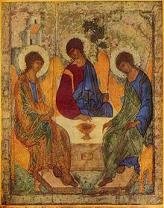 As I have suggested in this article, the Church only came to a true and real understanding of God through great struggle and debate. Revelation sets an abyss between the truth which it declares and the truths which can be discovered by philosophical speculation. If human thought guided by the instinct for truth – which is faith, though confused and uncertain – could, apart from Christianity, grope its way towards certain notions which approximated to the Trinity, the mystery of God-in-Trinity remained inscrutable to it. A ‘change of spirit’ was needed. The mystery of the Trinity only becomes accessible to that ignorance which rises above all that can be contained within the concepts of the philosophers. It required the superhuman efforts of an Athanasius of Alexandria, of a Basil, of a Gregory Nazianzen and of many others, to purify the concepts of Hellenistic thought, to break down the watertight bulkheads by the introduction of a Christian apophaticism (i.e., the knowledge of God obtaining only through negation, that is expressing what God is not). This approach transformed rational speculation into a contemplation of the mystery of the Trinity. It was a question of finding a distinction of terms which should express the unity of, and the differentiation within, the Godhead, without giving the pre-eminence either to the one or to the other; that thought might not fall into the error of a Sabellian Unitarianism or a pagan tritheism. The Fathers of the fourth century – that is the Trinitarian century par excellence – availed themselves by preference of the terms ousia and hypostasis (terms which my readers should now be well acquainted) to lead the intellect towards the mystery of the Trinity.
As I have suggested in this article, the Church only came to a true and real understanding of God through great struggle and debate. Revelation sets an abyss between the truth which it declares and the truths which can be discovered by philosophical speculation. If human thought guided by the instinct for truth – which is faith, though confused and uncertain – could, apart from Christianity, grope its way towards certain notions which approximated to the Trinity, the mystery of God-in-Trinity remained inscrutable to it. A ‘change of spirit’ was needed. The mystery of the Trinity only becomes accessible to that ignorance which rises above all that can be contained within the concepts of the philosophers. It required the superhuman efforts of an Athanasius of Alexandria, of a Basil, of a Gregory Nazianzen and of many others, to purify the concepts of Hellenistic thought, to break down the watertight bulkheads by the introduction of a Christian apophaticism (i.e., the knowledge of God obtaining only through negation, that is expressing what God is not). This approach transformed rational speculation into a contemplation of the mystery of the Trinity. It was a question of finding a distinction of terms which should express the unity of, and the differentiation within, the Godhead, without giving the pre-eminence either to the one or to the other; that thought might not fall into the error of a Sabellian Unitarianism or a pagan tritheism. The Fathers of the fourth century – that is the Trinitarian century par excellence – availed themselves by preference of the terms ousia and hypostasis (terms which my readers should now be well acquainted) to lead the intellect towards the mystery of the Trinity.
St. John Damascene gives the following definition of the conceptual value of the two terms in one of his writings, stating: ‘ousia is a thing that exists by itself, and which has need of nothing else for its consistency. Again, ousia is all that subsists by itself and which has not its being in another’.
So in essence the Fathers redefined Greek philosophical terms, using them to express theological ideas. Ousia became substance or essence and hypostasis became person. Thus God, as defined by the Church is of one substance or essence that is expressed in Three Persons. Of course this is a mystery and, although we have the language to express this mystery, it still remains a mystery beyond our comprehension.
